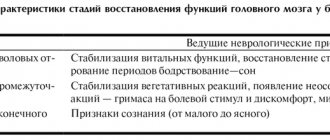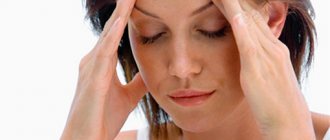We are accustomed to using the word “stress,” intuitively using it to denote strong neuropsychic tension. However, this meaning is not entirely correct.
The mechanism of stress was studied and described in detail by Hans Selye, and the term itself was introduced by Walter Cannon.
Stress is the body's general response to various factors (for example, shock, hypothermia, infection, death of a loved one, job loss) that disrupt its balance. The main function of stress is adaptation to changed environmental conditions.
Thus, the emotional reaction is only part of the body's overall response to a stressor.
Factors that cause stress can be absolutely anything - both negative and positive (wedding, moving, new job). All that matters is that they lead to changes in a person’s life at one level or another. It is typical for a person to have stressors of a psychological nature: stress is caused not by the situation itself, but by how a person subjectively evaluates and perceives it. Or even a fantasy, a memory of some situation.
Mechanism of stress
There are three main stages of stress:
- Mobilization stage. At this stage, the alarm reaction is activated. It mobilizes all the adaptive resources of the body and prepares it for urgent action. Energy exchange increases, heart rate increases, blood pressure rises, breathing quickens, digestion slows down, blood rushes to the muscles. In emergency situations, such as a fire, the alarm response can be very useful.
- Resistance stage. All body systems return to normal operation, and the development of new action programs (adaptation, adaptation to new circumstances) begins. The body has a certain reserve of resistance to stressors and adaptation.
- Exhaustion stage. In the case when the body was unable to adapt to new environmental conditions or develop a new program of action, resources are depleted. In this case, a person (and any organism) can get sick and even die.
What to do?
Alas, it is impossible to avoid stress in principle. This is a mechanism of adaptation to the environment. Stress can not only reduce, but also increase the body’s resistance to negative factors. To separate these polar functions there is the concept of stress and distress.
stress is tension that mobilizes and activates the body to combat the source of negative emotions;
Distress is excessive stress that reduces the body's ability to adequately respond to environmental demands.
Thus, avoiding stress altogether is the wrong policy. As well as looking for them on your own head on purpose.
Impact of stress
Under stress, hormonal changes occur in the body, which regulate the functioning of all body systems and cause the activation of resistance resources. Stress mechanisms involve, in particular, the subcortical parts of the brain, which are also responsible for emotions. Thus, during times of stress, one of the most typical emotional states is anxiety and worry. .
As a result of the action of neuroendocrine stress mechanisms, the so-called triad is formed: proliferation of the adrenal cortex, reduction of the thymus gland and gastric ulceration. These reactions can be easily compared with symptoms characteristic of almost any disease, such as a feeling of malaise, diffuse pain and aching sensations in the joints and muscles, gastrointestinal disorders with loss of appetite and loss of body weight.
Thus, severe or chronic stress is the basis for the occurrence of psychosomatic diseases .
It is better to recognize stress at the very beginning
otherwise, its level inside can grow to such an extent that neither work nor rest will simply become impossible. And this state will very quickly lead you to the idea that you seem to be terminally ill.
Here are the symptoms of stress by which it can be recognized at the very beginning.
Cognitive symptoms:
- Inability to focus and concentrate;
- Perception of predominantly negative aspects of life;
- Anxiety or racing thoughts;
- Difficulty in making decisions;
- Difficulties in mastering new information;
- Constant anxiety;
- Nightmares;
- Constant feeling of guilt;
- Inability to plan your life;
- Forgetfulness, disorganization
Emotional symptoms:
- Depression or feeling of lack of happiness;
- Low self-esteem: “I am lonely, insignificant”;
- Feeling of overload, loss of control over your life;
- Frequent tears, thoughts of suicide as a possible rest;
- Dejection;
- Apathy;
- Irritability, short temper;
- Agitation, inability to relax
Physical (somatic) symptoms:
- Nervousness, “shaking”;
- Weakness, fatigue;
- Muscle twitching, tremors;
- Pain, muscle hypertonicity, spasms;
- Diarrhea or constipation;
- Nausea, dizziness;
- Chest pain, tachycardia, bradycardia;
- Frequent colds and other infections;
- Decreased libido, potency or ability to have sex;
- Frequent belching, flatulence;
- Unexplained attacks of “allergy”;
- Weight gain or loss without changes in diet;
- Ringing, buzzing, clicking in the ears;
- Cold or sweaty palms or feet;
- Dry mouth, difficulty swallowing;
- Clenching of the jaws, grinding of teeth;
- Hair loss
- Acne (pustules on the skin);
- Skin rash, itching;
- Numbness of body parts;
- Hot/cold flashes;
- Sweating; control
- Tingling in various parts of the body;
- Decrease in overall energy level;
- Headache;
- Insomnia;
- Heartburn;
- Panic attacks;
- Feeling nauseous;
- Frequent urination;
- Difficulty breathing
Behavioral symptoms:
- Change in appetite;
- Excessive or insufficient sleep;
- Social isolation, isolation;
- Aggressiveness, hostility;
- Acute reactions even to ordinary stimuli;
- Defensive behavior or suspiciousness;
- Obsessive or compulsive behavior;
- Nervous behavior (nail biting, restlessness, constant movement);
- Loss of the need to take care of one’s appearance and be punctual;
- Stuttering, rapid or mumbled speech;
- Procrastination, neglect of obligations, irresponsible behavior;
- Using alcohol, cigarettes, drugs to relax;
- Lying or constantly making excuses to explain shortcomings and failures in work;
- An increase in the number of minor accidents or accidents that occur to a person;
- Excessive gambling, impulsive and thoughtless purchases;
Just because you have one or two of the symptoms on this list doesn't mean you're stressed, but the list does make it clear what stress can do if it goes unrecognized.
How people react to stress
People react to stress in three different ways.
1. “Hit.” Reaction to stress in the form of excitement, readiness to fight, in the form of aggression in order to eliminate the source of stress.
2. "Run." Withdrawal, depression, withdrawal into oneself or one’s own world, dissociation as a reaction to stress.
3. “Double” answer. A person freezes in tension and has no way to express it. The ability to act is paralyzed, and inside the person is extremely tense.
How to cope with stress
1. The most important way is to avoid unnecessary stress. Why would you want to get into a fight on a social network or in a queue? Why fly on vacation to a distant country where, according to rumors, a change of power is taking place? Think twice when planning your actions and especially when you are driven by emotions.
2. Try to change the situation. Get advice, call for help, pick up a stick - whatever will change the situation in your favor.
3. If the situation cannot be changed, try to adapt to the stress factor. If the stressor is a person, look at the situation through his eyes and understand the reasons for his behavior. If stress is caused by too much workload, try to find additional resources to gain strength. In any case, to adapt to the stressor, it is better to talk about your situation to someone who knows how to listen. By talking through the situation again and again, you will be able to see what previously remained in the shadows. And maybe change your attitude towards stressful situations. A good resource is a way out of the situation with a complete change of environment, activity, and social circle. If there are no opportunities for such a way out, try to do something crazy right in your situation, something that you have never done before. Often this allows you to obtain a new resource for adaptation.
4. Accept the things you cannot change. Does your husband drink and is not going to quit, despite all your joint conversations and plans about this? Look at this with open eyes and tell yourself: “Stop. This will never happen." “Yes, I’m not handsome, but that’s no reason to be unhappy.” “Yes, I don’t have (someone or something) now, and most likely never will. But there is my life, friends, work, etc.” “This world is unfair to me. But he is just as unfair to many. However, he gave me (such and such).” These are examples of accepting statements that, despite all the painful processes of awareness and acceptance of the situation, have extraordinary healing power, releasing a large amount of resources and restoring the boundaries of the individual for a further full life.
There are several other ways to cope with stress that may seem minor at first glance, but are actually quite effective:
- Laughter. When your brain can no longer think, simply take your mind off the situation by watching some good comedy.
- Massage. In a stressful situation, the body is under tension and massaging the back or feet helps to cope with this tension.
- Be alone for a while. Often the best way is to collect your thoughts and look at the situation in a new way. Take a shower, go for a walk, sit in a cafe, take a nap, or just work alone. Hand the children over to your husband (wife, grandmother, grandfather, nanny), and be alone for a few hours. This is a powerful resource for restoring internal balance.
- Do something useful for yourself. Often stress increases because you feel that the situation in your business, at home, or your illness is out of control. Sometimes, paradoxically, in such a situation, it can help to cook dinner, go to the laundry, clean up the house, or do a manicure, hair, or makeup.
So, the main thing you need to learn is don’t let stress take its course . Unrecognized stress reactions in the body over time lead to significant difficulties in life and at work, and later to somatic diseases.
Benefits from stress
Exposure to mild stressors is somewhat beneficial. Firstly, mild short-term stress helps to activate resources and mobilize to perform a specific task (for example, to pass an exam). Secondly, with each stress, the psyche appears several new activity programs, that is, a person expands and replenishes his behavioral “repertoire” with new ways of interacting with the outside world, and increases self-confidence with each obstacle overcome. The natural need for renewal of emotions is saturated. It is important that the body has enough reserves to adapt.
Sources
- Kieseppä V., Jokela M., Holm M., Suvisaari J., Gissler M., Lehti V. Post-traumatic stress disorder among immigrants living in Finland: Comorbidity and mental health service use. // Psychiatry Res - 2021 - Vol300 - NNULL - p.113940; PMID:33906030
- Aloufi MA., Jarden RJ., Gerdtz MF., Kapp S. Reducing stress, anxiety and depression in undergraduate nursing students: Systematic review. // Nurse Educ Today - 2021 - Vol102 - NNULL - p.104877; PMID:33905898
- Tiwari D., Das CR., Sultana R., Kashyap N., Islam M., Bose PD., Saikia AK., Bose S. Increased homocysteine mediated oxidative stress as a key determinant of hepatitis E virus (HEV) infected pregnancy complication and outcome: A study from Northeast India. // Infect Genet Evol - 2021 - Vol - NNULL - p.104882; PMID:33905889
- Althubiti M., Elzubier M., Alotaibi G.S., Althubaiti M.A., Alsadi HH., Alhazmi ZA., Alghamdi F., El-Readi MZ., Almaimani R., Babakr A. Beta 2 microglobulin correlates with oxidative stress in the elderly . // Exp Gerontol - 2021 - Vol - NNULL - p.111359; PMID:33905876
- Barteková M., Adameová A., Görbe A., Ferenczyová K., Pecháňová O., Lazou A., Dhalla NS., Ferdinandy P., Giricz Z. Natural and synthetic antioxidants targeting cardiac oxidative stress and redox signaling in cardiometabolic diseases. // Free Radic Biol Med - 2021 - Vol - NNULL - p.; PMID:33905865
- Xiao S., Mao L., Xiao J., Wu Y., Hongmei L. Selenium nanoparticles inhibit the formation of atherosclerosis in apolipoprotein E deficient mice by alleviating hyperlipidemia and oxidative stress. // Eur J Pharmacol - 2021 - Vol - NNULL - p.174120; PMID:33905703
- Basu S., Roychoudhury A. Transcript profiling of stress-responsive genes and metabolic changes during salinity in indica and japonica rice exhibit distinct varietal differences. // Physiol Plant - 2021 - Vol - NNULL - p.; PMID:33905541
- Lombardi M., De Gara L., Loreto F. Determinants of Root System Architecture For Future-Ready, Stress-Resilient Crops. // Physiol Plant - 2021 - Vol - NNULL - p.; PMID:33905535
- Xue F., Liu W., Cao H., Song L., Ji S., Tong L., Ding R. Stomatal conductance of tomato leaves is regulated by both ABA and leaf water potential under combined water and salt stress. // Physiol Plant - 2021 - Vol - NNULL - p.; PMID:33905534
- Zhang F., Rao S., Cao H., Zhang X., Wang Q., Xu Y., Sun J., Wang C., Chen J., Xu X., Zhang N., Tian L., Yuan J ., Wang G., Cai L., Xu M., Baranova A. Genetic evidence suggests posttraumatic stress disorder as a subtype of major depressive disorder. // J Clin Invest - 2021 - Vol - NNULL - p.; PMID:33905376
Help from a psychologist for stress
A psychologist’s help with stress can be used in two ways:
- If any new situation is stressful for you. You often experience a state of causeless anxiety, are depressed, irritable, depressed in the absence of objective reasons. For you, there are a large number of stress factors of psychological origin. Stress is not caused by objective reasons, but by your subjective assessment of what is happening, expectation of the worst consequences, etc. In this case, sessions with a psychologist will help change your assessment of what is happening and reduce the amount of stress of psychological origin.
- Neutralizing the effects of stress. Classes with a psychologist in this direction will help if you have already experienced severe stress , your energy reserves have been depleted, and you feel the need to recover. It is also important to work through and understand the emotional causes of the psychosomatic illness that has arisen in order to prevent its further development.
Amber Center specialists have experience in successfully working with the causes and consequences of stress. After a psychological diagnosis, a psychologist (psychotherapist) will develop an individual training route and, if necessary, give exercises for independent work at home.
Make an appointment with a specialist by calling (812) 642-47-02 or fill out the application form on the website.
Causes
The main reason is the situations that provoke it, they are called stress factors. Considering that the life of a modern person is dynamic and unpredictable, there are a great many reasons. Constant troubles, misunderstandings with loved ones, pressing stress at work, breakdowns of household appliances or cars, and just everyday worries. All this provokes irritation and anxiety.
Sometimes the lack of change, routine and “Groundhog Day” can be the main reason. Each person has their own individual mental characteristics, which for one is an annoying nuisance, for another a cause of stress.
Causes
Main reasons
- conflicts with family and friends;
- unemployment and debt;
- overwork, lack of vacation;
- chronic diseases and excess weight
- dissatisfaction with oneself and one's appearance
Stress develops at three levels: biochemical, psychological and physiological.
When a person finds himself in a stressful situation, his blood glucose level rises, blood pressure rises, the heartbeat becomes more frequent, the deposition of fatty tissue in the subcutaneous tissue increases, sodium is retained, and with it water in the tissues, and potassium, which is necessary for the functioning of the heart and nerves, is eliminated faster than necessary.










